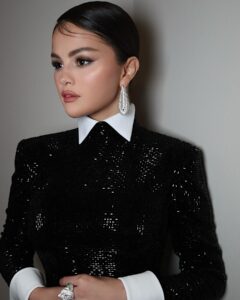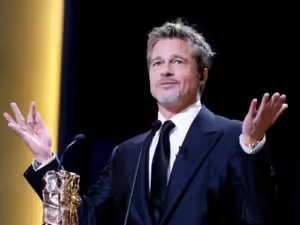
Tallulah Willis, the youngest daughter of Bruce Willis and Demi Moore, recently shared a personal journey that has deeply resonated with fans.
Diagnosed with autism at 29, she’s now reflecting on her life through a new lens and is grateful for the life lessons her family instilled in her, particularly her father’s guidance on self-compassion.
Tallulah has been open about the impact of her diagnosis, the importance of self-acceptance, and how Bruce Willis taught her to be gentle with herself amid life’s challenges.
Here’s a closer look at Tallulah’s path toward self-acceptance and the role her father’s wisdom played in helping her embrace her authentic self.
1. Tallulah’s Path to Diagnosis: A Lifelong Journey of Self-Discovery
Though Tallulah only recently received an autism diagnosis, she can trace signs of autism back to her childhood.
In an interview with Us Weekly, she shared that sensory sensitivity, particularly to sounds, was an early sign.
Her elementary school experience included a memorable coping mechanism devised with her second-grade teacher—sitting under her desk and plugging her ears to block out overwhelming noise.
This behavior, though a telltale sign in retrospect, went largely unrecognized in her youth due to limited understanding and awareness of autism at the time.
Tallulah acknowledged that she had moments of reflection where past experiences aligned with autism traits.
Yet, the diagnosis brought a sense of clarity and relief, helping her understand herself better and find acceptance.
Tallulah revealed that she now recognizes the obstacles she previously saw as “deterrents” and has begun viewing them through a more forgiving lens.
2. Embracing Her Father’s Wisdom: Learning to Be Gentle with Herself
One of the most powerful influences in Tallulah’s life has been her father, Bruce Willis.
Known for his action-hero persona, Bruce has always approached parenting with a sense of empathy and compassion.
Tallulah shared that Bruce encouraged her to be gentle with herself, a piece of advice that has proved invaluable in her self-discovery journey.
In her words, Bruce was a “big proponent” of self-compassion, teaching her to extend grace to herself rather than judging the unique parts of who she is.
Reflecting on her father’s influence, Tallulah expressed how Bruce’s words resonated particularly deeply as she navigated her autism diagnosis.
While the natural tendency may be to judge oneself harshly, Bruce’s advice empowered her to accept herself and view her quirks with kindness.
This life lesson has become a cornerstone of her mental and emotional well-being, helping her better understand and embrace her autism.
3. A Public Journey with Autism: Raising Awareness and Breaking Stigmas
Tallulah’s decision to share her autism diagnosis with the world was carefully considered.
She noted that while she wasn’t hesitant to be open about her experience, she wanted to be thoughtful about how to present it.
She ultimately chose to announce her diagnosis with an Instagram video, a nostalgic and meaningful clip of herself as a child playing with her father’s ear on a red carpet.
In her caption, she humorously referenced the tell-tale signs of autism, creating a moment that resonated widely with her followers and autism advocates.
The video served as a light-hearted yet impactful way of connecting with others. Tallulah admitted that her choice to post was spontaneous—she hadn’t planned it or consulted with anyone beforehand.
The video’s candid nature reflected her authentic self, and she hoped others could relate to it and find some comfort or recognition in her story.
Tallulah’s openness has been lauded as a way to bring autism awareness into mainstream conversations, shedding light on how a diagnosis can offer life-changing clarity and understanding.
4. Reflecting on Her Childhood and Recognizing Early Signs of Autism
For Tallulah, reflecting on her childhood with a fresh perspective allowed her to recognize behaviors that, with today’s greater understanding of autism, clearly pointed to the diagnosis.
She spoke of specific childhood moments, like her coping mechanism with noise sensitivity in the classroom.
These behaviors, once puzzling, now make more sense, helping her piece together an understanding of her autism that was previously elusive.
Tallulah’s experiences reflect those of many who receive a diagnosis later in life, as she now has a newfound awareness of traits she once thought were unrelated.
This personal growth is central to her message of acceptance and self-love, as she hopes her experiences can serve as a beacon for others who are on similar journeys of self-understanding.
5. Honored for Advocacy: Recognizing Tallulah’s Impact on the Autism Community
Tallulah’s openness about her journey has not gone unnoticed.
She was honored at the 2024 Autism Speaks Gala for her role in raising autism awareness, using her platform to support and advocate for individuals on the autism spectrum.
This recognition was deeply meaningful for Tallulah, who admitted feeling a mix of disbelief and imposter syndrome upon receiving the honor.
She emphasized that the diagnosis brought immense relief and a sense of validation, which is still something she’s adjusting to.
This acknowledgment from both her family and the autism community has reinforced her commitment to continue sharing her story.
Tallulah’s advocacy efforts demonstrate the value of visibility and representation, especially as her platform helps combat stigmas and promotes acceptance of neurodiversity.
6. A Family Legacy of Support: The Influence of Bruce Willis and Demi Moore
Tallulah is the youngest of Bruce Willis and Demi Moore’s three daughters, alongside Rumer, 36, and Scout, 33.
Following her parents’ separation in 2000, Bruce remarried Emma Heming Willis, with whom he shares two more daughters, Mabel, 12, and Evelyn, 10.
Tallulah has spoken of how her parents and siblings have been supportive pillars throughout her journey.
Bruce’s compassionate parenting style and Demi’s advocacy for mental health have helped create a family environment that encourages self-expression and understanding.
Her family’s encouragement and openness provided a foundation that allowed Tallulah to explore her identity without fear of judgment.
The support has made her autism journey feel like a natural extension of her family’s values of kindness, patience, and resilience.
Tallulah Willis Opens Up About Autism Diagnosis and How Family Support Shaped Her Journey

Tallulah Willis, the daughter of iconic actor Bruce Willis, recently shared insights into her autism diagnosis and how her family has been a source of strength through her journey.
Diagnosed at 29, Tallulah has openly discussed how she has embraced her neurodivergence, what it has meant for her daily life, and how her parents reacted to the news.
Her story provides a powerful look at the experiences of adults who receive an autism diagnosis later in life and sheds light on the signs of autism that can go unnoticed for years.
Bruce Willis’s Support and Gentle Guidance Through the Autism Diagnosis
Bruce Willis has long been known for his action-hero roles, but according to Tallulah, he’s been a hero in her life in a much more personal way.
From a young age, Bruce taught her the importance of self-compassion and “being gentle” with herself.
Tallulah says that her father’s wisdom allowed her to adopt a mindset that was crucial when facing her autism diagnosis.
She shared in an interview that Bruce’s encouragement to accept and be kind to herself has been transformative as she learns to navigate life with autism.
Tallulah credits Bruce’s steady support as a guiding force, especially when grappling with the aspects of autism that sometimes make daily life challenging.
For her, Bruce’s gentle parenting style was foundational, helping her let go of judgment and embrace self-acceptance.
This approach has empowered her to openly share her story with the public, a decision she feels can help others understand and feel seen in their experiences.
The Impact of Tallulah’s Autism Diagnosis on Her Daily Life
Receiving an autism diagnosis as an adult can be life-changing.
For Tallulah, the diagnosis offered relief and validation, but it has also introduced new challenges. Autism, particularly when diagnosed later in life, brings changes to daily routines, sensory perceptions, and social interactions.
Tallulah has shared that sensory sensitivity, like heightened reactions to sound, has affected her since childhood.
This sensitivity impacts her daily activities, making her more mindful of noise levels and environments that might feel overwhelming.
Tallulah’s experiences with sensory overload are common among adults on the autism spectrum.
Many adults find that auditory and visual stimuli can be especially overstimulating, leading them to create strategies, like wearing headphones in crowded places or finding quiet spaces, to manage sensory input.
For Tallulah, her diagnosis brought understanding to these lifelong sensitivities and helped her adopt practices that work for her needs.
How Tallulah’s Parents Reacted to Her Autism Diagnosis
Tallulah’s journey with autism has been met with unwavering support from her family.
In addition to her father’s influence, her mother, Demi Moore, has been a vocal advocate for mental health and self-care.
When Tallulah shared her diagnosis, her family embraced her news with understanding and acceptance, reinforcing their role as a supportive foundation in her life.
Her parents’ compassion highlights the positive impact that family support can have for individuals who are newly diagnosed.
For Tallulah, the understanding and empathy from her parents have created a nurturing environment that allows her to explore her neurodivergence with confidence.
Studies show that family acceptance can play a significant role in the mental and emotional well-being of those with autism, particularly adults diagnosed later in life.
Tallulah’s family support has not only allowed her to feel validated but has also empowered her to become an advocate, using her platform to raise awareness and educate others about autism.
Common Signs of Autism in Adults: Understanding the Traits That Often Go Unnoticed
Tallulah’s story resonates with many adults who realize they are on the autism spectrum after years of masking or misinterpreting their experiences.
Some common signs of autism in adults include heightened sensory sensitivities, challenges in social settings, and specific routines or rituals.
Adults on the spectrum may experience intense focus on particular interests, difficulty with social cues, and an affinity for routines, which can be mistaken for personality traits rather than signs of autism.
Here are some key indicators that often go unnoticed in adults:
- Sensory Sensitivity – Sensitivity to lights, sounds, textures, and other sensory inputs is common among autistic individuals.
Tallulah mentioned her struggle with sound sensitivity, a trait shared by many adults on the spectrum who often feel overwhelmed in noisy or brightly lit spaces. - Difficulty with Social Cues – Many autistic adults find it challenging to interpret non-verbal cues, like facial expressions or tone of voice.
This can lead to misunderstandings in social interactions, with others often misinterpreting an autistic person’s intentions. - Need for Routine – Predictable routines provide comfort to many autistic adults, helping them navigate their day with less anxiety.
Sudden changes can be particularly distressing, making flexibility a skill that many work to develop. - Focused Interests – Many autistic adults have intense interests or hobbies that provide fulfillment and relaxation.
These focused interests can offer a sense of purpose, though they may be viewed as overly intense by those outside of the autism community.
Recognizing these signs can be transformative, leading to increased understanding and acceptance from friends, family, and individuals themselves.
How Childhood Experiences Shaped Tallulah’s Understanding of Her Autism
Reflecting on her childhood, Tallulah has identified behaviors and experiences that she now understands were tied to her autism.
One significant memory involved a coping strategy she developed in second grade: when the classroom became too loud, she would sit under her desk and cover her ears.
This behavior, which may have been viewed as quirky at the time, now stands out as a clear sign of sensory overload.
Tallulah’s experiences as a child highlight the importance of early recognition and understanding of autism.
For many children who grow up undiagnosed, these behaviors are often labeled as “quirky” or “odd” rather than being recognized as part of autism.
Today, greater awareness of autism in children is helping educators, parents, and medical professionals identify signs earlier, allowing for support systems to be put in place.
Tallulah’s story serves as a reminder of how these early experiences influence one’s understanding of autism later in life.
Raising Awareness and Embracing Self-Acceptance: Tallulah’s Advocacy Journey
Today, Tallulah is using her platform to advocate for autism awareness, hoping to create a world where neurodiversity is celebrated and better understood.
She shared her diagnosis publicly through a heartfelt Instagram video, choosing a moment that connected her childhood with her current journey.
In the clip, Tallulah lovingly interacts with her father, Bruce Willis, and references the traits that led her to consider autism testing.
Tallulah’s advocacy has been widely appreciated, as she provides a voice for adults who receive autism diagnoses later in life.
Through interviews and public appearances, she is raising awareness about the realities of adult autism and the importance of accepting one’s authentic self.
Her story resonates with countless individuals who may feel validated by seeing someone with similar experiences embrace their neurodivergence.



















